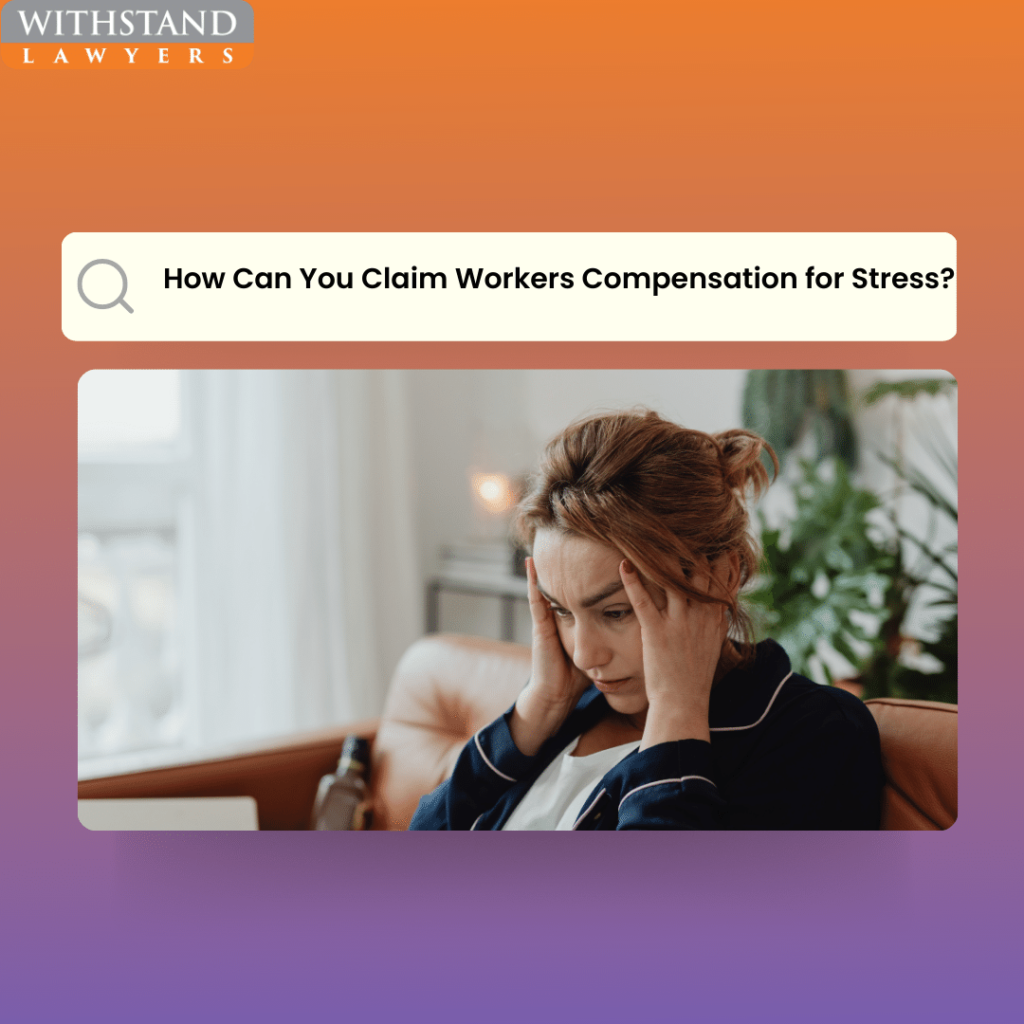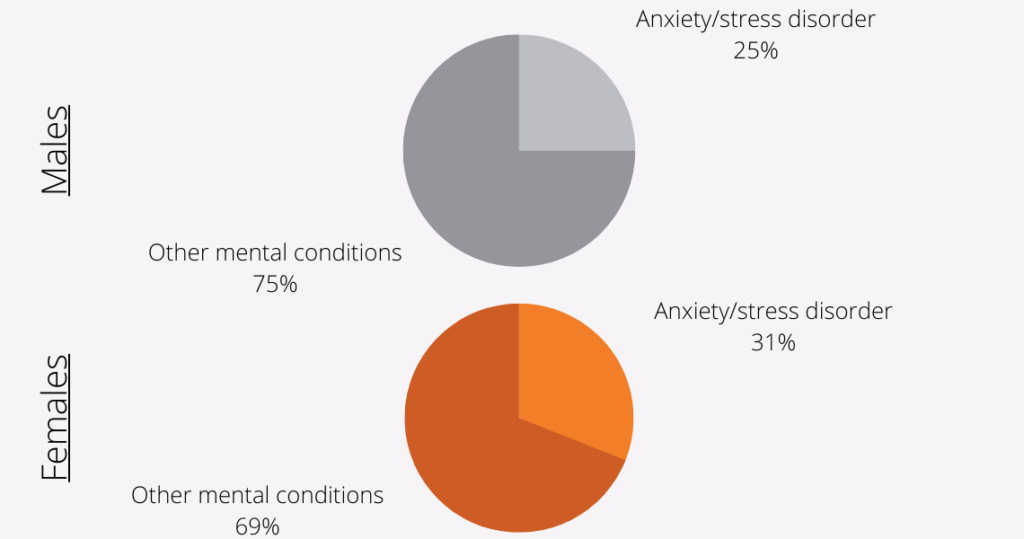Complete Guide to Workers Compensation Stress Leave

Are you unable to work due to stress? Will you need take time off and put in stress leave?
Claiming for a stress leave can be confusing. In this post, I aim to help you with answering following questions:
- What is your workplace stress related entitlements?
- Are you eligible to claim workers compensation for stress?
- What is your workplace stress related entitlements?
- Are you entitled to a lump sum payout?
- Do you get paid for stress leave?
- How can Withstand Lawyers can help you regarding stress leave NSW? And more.
Compensation for PTSD in Australia
The workers compensation scheme in New South Wales does not exclude work-related risks relating to mental health and safety in the workplace. All employers in NSW are required to minimise the presence of stressors for their employees per work health and safety laws since stress is one of the main work-related factors that could be damaging your mental health. If you suffered a physical or mental injury due to stress, you may be entitled to:
Weekly wages
Weekly payment based on your pre injury wages
Medical Expenses
Reasonable and necessary medical expenses due to your injuries
Lump sum payment
If your injuries are assessed at being greater than 10% whole person impairment for a physical injury or greater than 14% whole person impairment for a primary psychological injury. If you are an exempt worker such as police officer, paramedic or fire fighter then you eligible to claim lump sum if your physical injury is assessed at being greater than 0% whole person impairment
Domestic assistance
If your injuries are greater than 14% whole person impairment
Common law payout
Work injury damages if your injuries are greater than 14% whole person impairment and your employer was negligent

What can you claim for workplace stress compensation?
If you sustained a work-related stress injury, you may be entitled to weekly payments and medical expenses for your losses arising from it. If your injury is assessed being at 15% whole person impairment or greater, you can also claim a lump sum payment. The extent of compensation you will receive will depend on the seriousness of your injury. Consulting our experienced workers compensation lawyer will give you more insight on what you can claim for your specific case.
Are you eligible to claim compensation for workplace stress?
Stress is not considered as an injury by itself under the workers compensation scheme in NSW. However, aggravated stress can cause a psychological condition that may qualify as an injury and enable you to claim compensation based on it.
To prove your stress-related psychological injury, a diagnosable injury by your doctor is required. A doctor’s assessment through the Certificate of Capacity will help you define and prove your situation as a psychological injury eligible for compensation.
On the other hand, you should also be able to prove that your stress-related injury is caused by work, which can be a complex process and will require a proper diagnosis from your GP and legal advice from our workers compensation lawyer.

How can you claim compensation for workplace stress?
Compensation claims for both physical and psychological work-related injuries should be made within 6 months from the date of the injury. If you suffered from a work related injury and 6 months have passed without you making a claim yet contact us as there exceptions based on specific circumstances. If your injury was assessed at least 15% whole person impairment then you could be entitled to make a work injury damages claim which should be commenced in court if not already settled within 3 years from the date of injury.
It is important that you immediately notify your employer or the insurer of your injury upon being aware of it. You should then consult a doctor or the General Practitioner about your condition and request a “Certificate of Capacity” be completed in support of your claim form
This certificate will act as the medical evidence of your stress-related injury and your inability to work as a result of it. As the last step, you should complete and submit a work injury claim form to the employer or insurer directly in order to claim your wages and medical expenses, travel expenses and lump sum entitlements, if eligible.
To make a stress leave workers compensation claim we can help you. Our workers compensation lawyers are approved by the Independent Review Office (IRO) which means your legal costs and disbursements are covered by IRO meaning you do not pay for our legal fees to act on your behalf for your workers compensation claim.
Workers compensation stress leave in NSW
What is stress leave from work?
Fair Work Australia states that an employee can take paid sick leave when they can’t work because of a personal illness or injury, which includes stress-related illnesses.
That means that you can take stress leave if you suffered a stress-related physical or mental illness.
Is stress leave paid in Australia?
The answer depends on the employment contract of the employer. Stress leave under the annual sick leave allowance is generally 2 weeks in NSW.
On the other hand, if you are not able to work due to a stress-related illness, you may be entitled to:
- Various workers compensation benefits (Click here to learn more)
- TPD superannuation lump sum payout (Click here to learn more)
You can reach our experienced personal injury lawyers to understand your entitlements.

How long can you take stress leave for in Australia?
In Australia, if you need to take time off work due to a stress-related illness, your entitlements will depend on your employment contract. This means that the amount of time you can take off work will depend on the sick leave allowance in your contract, as well as any other leave allowances your employer may offer. For example, if you work in NSW, you may be entitled to two weeks of sick leave every year. In this case, you can take two weeks of stress leave.
However, if you are an employee or contractor dealing with a stress-related illness, you may be entitled to more time off work without using up your sick leave, as well as other benefits to help you with your treatment and recovery. In NSW, the workers’ compensation scheme provides benefits to support you if you have a diagnosed psychological illness that was caused by work-related stress.
Is stress leave sick leave?
Mostly yes! According to the Fair Work Ombudsman of Australia, if you have a stress-related illness, you can take sick leave just like any other illness and your employer should treat it the same way they would treat any other type of sick leave.
How common are stress-related workers compensation claims?
According to Safe Work Australia’s report, stress and anxiety-related workers compensation claims account for more than one-fourth of all psychological injury claims.
Anxiety/stress-related injuries account for 31% of all female and 25% of all male psychological injury claims.

Eight main risk factors giving way to work-related stress:
SafeWork Australia identifies eight main risk factors giving way to work-related stress:
- Work demands like strict deadlines
- Monotonous or dull tasks
- Working long hours and emotionally demanding assignments
- Low levels of control
- Poor support from supervisors and co-workers
- Lack of role clarity, poorly managed relationships
- Low levels of recognition and reward
- Poorly managed change and problems with organisational justice.
In turn, employers are advised to take measures for preventing stress such as providing regular performance feedback, creating a healthy workplace culture, and training employees for self-management of stress.
For employees, constant exposure to stress can lead to physical, mental, emotional, and behavioural problems ranging from headaches and tiredness to anger, anxiety, and low work performance. SafeWork Australia warns organisations that high stress levels of workers can result in declined productivity, unsatisfied clients, more frequent workplace conflicts, and rise in sick leaves.
Why use a lawyer for your workers compensation stress claim?
To put it simply –you have nothing to lose. Our workers compensation lawyers are approved lawyers by the Workers Compensation Independent Review Office (WIRO) which means that you are not liable for any costs or disbursements in advising you and managing your claim on your behalf should that be required. This means that you will have the benefit of having legal advice by our senior personal injury lawyers to ensure your claim is being managed correctly and to ensure you are receiving your entitlements.
Our senior workers compensation lawyers are available NSW wide. Our personal injury lawyers also do home visits for injured clients who are unable to travel to our office. Call us on 1800 952 901 or book a consultation to receive stress-free assistance. And let us maximise your workers compensation claim without adding to your stress.

Issa Rabaya
• Bachelor of Laws
• Graduate Diploma in Legal Practice
• Approved Legal Service Provider to the Independent Review Office
• Member of the Law Society
The workers compensation scheme in New South Wales does not exclude work-related risks relating to mental health and safety in the workplace. All employers in NSW are required to minimise the presence of stressors for their employees per work health and safety laws since stress is one of the main work-related factors that could be damaging your mental health. If you suffered a physical or mental injury due to stress, you may be entitled to:
Free Initial Consultation

Related blogs

Can I retire while on workers compensation?
What happens to my workers’ compensation payment when I reach the retirement age? If you have been receiving weekly payments through your workers’ compensation claim

Can Your Workers Compensation Claim Be Denied?
If you have been injured in the course of employment you are entitled to workers compensation entitlements which include but are not limited to wages,

Emotional Distress After a Car Accident
A car accident causes shock for most people and more serious symptoms and injuries for others. You may be entitled compensation for your psychological/psychiatric injuries

Workers Compensation Weekly Benefits in NSW
Employers have a responsibility to fulfil their occupational health and safety obligations. This responsibility ensures that you receive entitlements if you are injured while working


